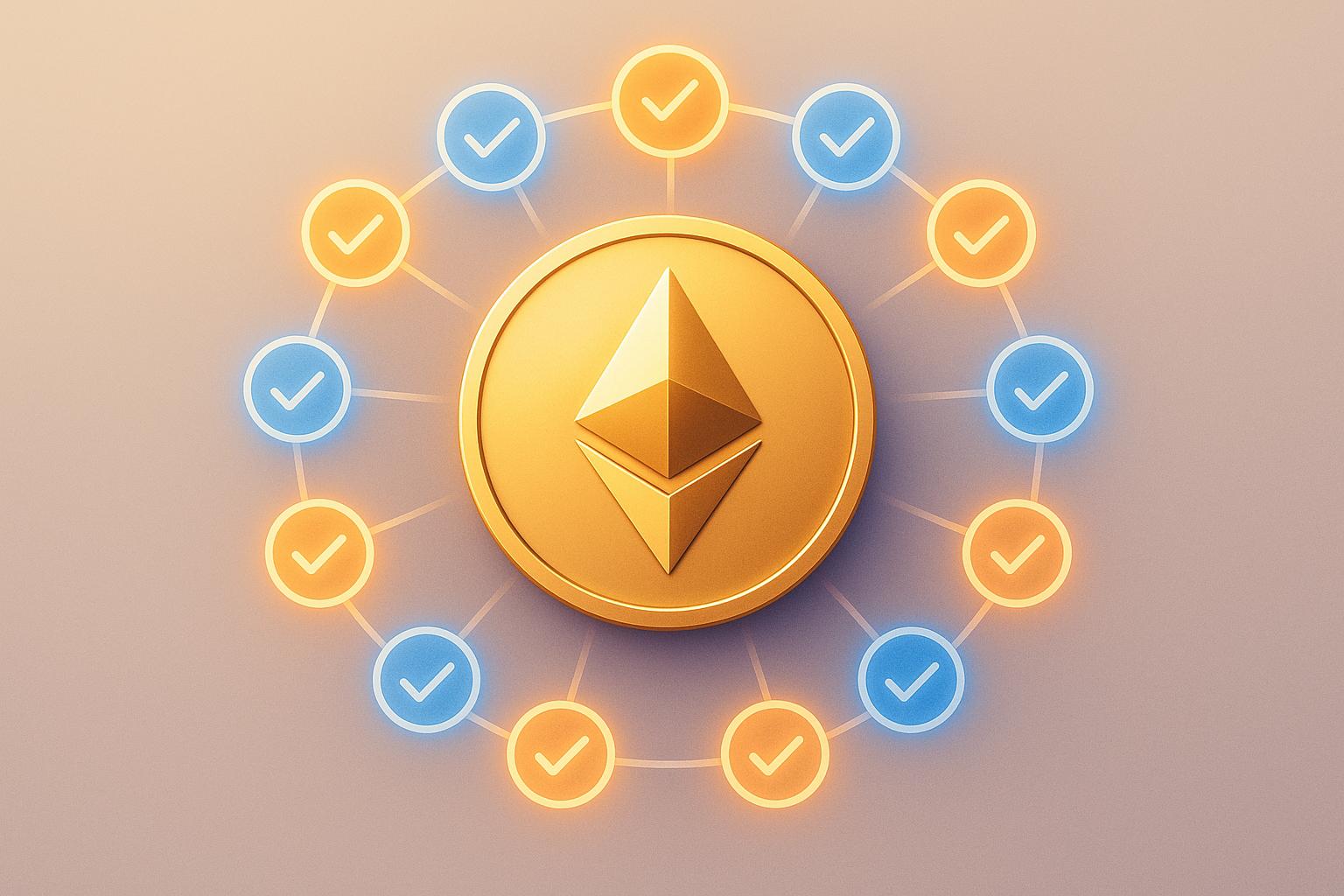
Evolution of Voting in Ethereum DAOs
Ethereum DAOs have transformed decision-making by using blockchain-based voting systems. Early models relied on token-weighted voting, where power was tied to token ownership. However, this led to issues like dominance by large stakeholders ("whales") and low participation. Over time, alternative methods like quadratic voting, reputation-based systems, and hybrid on/off-chain governance emerged to address these challenges. Today, DAOs balance transparency, security, and efficiency with advanced frameworks such as delegation, identity-based voting, and AI tools to improve participation and fairness. These innovations are shaping decentralized governance and offer lessons for organizations exploring collective decision-making.
DAO Governance Explained: How Voting & Proposals Work in DAOs
Early Governance Models and Problems
The first generation of Ethereum DAOs (2016–2019) relied on simple voting mechanisms that revealed major flaws. While these early systems laid the groundwork for future improvements, they also highlighted significant challenges that needed to be addressed.
Token-Weighted Voting Systems
In the early days, token-weighted voting was the go-to method for decision-making in Ethereum DAOs. Here, voting power was directly tied to the number of tokens held by an individual or entity. Votes were recorded on the Ethereum blockchain using smart contracts, creating a transparent and tamper-proof record of decisions.
However, this system had glaring weaknesses. Power became concentrated in the hands of "whales" – large token holders – who could dominate outcomes, leaving smaller investors feeling sidelined. Many smaller participants lost interest in voting, believing their contributions had little impact compared to the influence of larger stakeholders. This voter apathy often led to stalled decisions, especially when high quorum thresholds were required.
Kenneth Arrow’s criteria for fair voting systems further exposed the flaws of token-weighted models. These systems struggled with the "no dictator" principle, as decisions were often controlled by a few dominant token holders.
How The DAO Hack Changed Governance
The fragility of token-weighted systems became painfully clear during The DAO hack of 2016. This event marked a turning point, as it exposed critical vulnerabilities in early governance models. The attack drained millions of dollars from The DAO’s treasury, highlighting how simple token-based voting systems were ill-equipped to handle sophisticated attacks. DAO 1.0 prioritised automation but lacked the necessary safeguards to ensure security.
The hack demonstrated the dangers of concentrating power in the hands of a few and underscored the need for more secure and balanced governance mechanisms. In response, developers began exploring advanced solutions, such as cryptographic voting and multi-signature approvals, to improve both transparency and security.
These lessons shaped the development of more resilient governance systems. Events like the Beanstalk hack in 2022 further accelerated this evolution, encouraging the adoption of innovative approaches like quadratic voting and holographic consensus. The challenges and failures of early models ultimately became a catalyst for designing smarter, more inclusive governance structures.
Development of New Voting Methods
In the early days, token‐weighted voting systems faced significant challenges like dominance by large token holders (often called "whales"), low voter turnout, and frequent decision-making deadlocks. These issues drove the need for better voting methods. By 2024, DAOs (Decentralized Autonomous Organizations) began using six key voting systems: Token‐Based Quorum Voting, Quadratic Voting, Conviction Voting, Holographic Consensus, Reputation‐Based Voting, and Bicameral Systems.
Quorum-Based and Supermajority Voting
Quorum‐based voting was designed to tackle low participation by requiring a minimum level of voter engagement for decisions to be valid. This prevents small groups from making decisions on behalf of the entire community. For instance, a DAO might require 30% of its members to participate in a vote. If only 25% show up, a proposal could fail – even if it has strong support. This was evident during critical governance discussions, such as Ethereum Classic‘s hard fork debate, where low participation caused prolonged uncertainty.
Supermajority voting, on the other hand, raises the bar for approval by requiring a higher consensus threshold – typically 66% or more – rather than a simple 51% majority. This ensures that major decisions, like protocol changes or treasury allocations, have widespread community support. While this method helps avoid divisive or rushed decisions, it can also make passing essential proposals difficult, especially in diverse communities. Some DAOs have combined quorum thresholds with supermajority requirements to strike a balance for high-stakes decisions.
These participation-focused systems laid the groundwork for exploring voting methods that factor in voter intensity and long-term engagement.
Quadratic and Conviction Voting
Moving beyond basic threshold models, quadratic and conviction voting introduced more nuanced ways to measure individual influence and sustained support.
Quadratic voting allows participants to express how strongly they feel about an issue by "buying" votes. The catch? The cost of each additional vote increases quadratically. For example, while the first vote might cost 1 token, the second costs 4 tokens, and the third costs 9 tokens. This structure limits the influence of wealthy participants and amplifies minority voices. Gitcoin DAO has successfully used quadratic voting for grant allocations, ensuring more balanced funding outcomes.
Conviction voting takes a different approach by emphasizing time. Instead of casting votes once, participants signal their support for proposals over time, with their voting power growing as their conviction strengthens. This method prioritizes proposals with sustained community backing rather than those that generate short-lived enthusiasm. Colony DAO, for example, combines conviction voting with reputation-based systems to balance influence and participation.
While these methods offer new possibilities, they also introduce added complexity. To address this, many DAOs have focused on improving user interfaces, educating members, and conducting thorough smart contract audits to ensure transparency and security. Hybrid systems are also becoming popular. For instance, Optimism DAO combines bicameral systems with supermajority rules, while other DAOs mix quorum thresholds with quadratic voting. These combinations reflect the understanding that no single voting method can solve every governance challenge.
For Canadian organisations, these advanced voting systems provide tools for more flexible and inclusive governance. Companies like Digital Fractal Technologies Inc offer secure, custom software solutions that incorporate these methods while adhering to Canadian data privacy standards.
sbb-itb-fd1fcab
New Governance Frameworks
As DAOs evolve, so do their governance mechanisms, moving beyond basic voting systems to tackle challenges like participation, representation, and fairness. These new frameworks aim to meet the unique needs of diverse communities while improving decision-making processes.
Delegation and Liquid Democracy
Delegation and liquid democracy have transformed DAO governance by allowing token holders to delegate their voting power to trusted representatives instead of voting on every proposal themselves. This approach offers flexibility, enabling participants to empower subject matter experts or active community members while retaining the option to reclaim their voting rights for specific proposals.
Take Optimism DAO, for example. In Q2 2024, it introduced a bicameral governance model that separates responsibilities between a Token House for token holders and a Citizen House for active contributors. This structure boosted proposal review efficiency and increased member engagement by 19%. Similarly, Compound DAO has adopted delegated voting to streamline its decision-making.
However, delegation systems come with risks, such as the potential for over-centralization if voting power becomes concentrated among a few popular delegates. Transparency and accountability are essential to mitigate these risks. By addressing scalability and incorporating expertise, delegation enhances earlier voting methods.
Identity-Based and Reputation-Weighted Voting
Moving away from token-based governance, identity-based and reputation-weighted voting systems focus on fairness by linking voting influence to verified identity or meaningful contributions, rather than financial stake alone.
Identity-based voting ensures that each vote corresponds to a unique individual, reducing the risk of Sybil attacks, where bad actors create multiple accounts to manipulate outcomes. Verification methods – such as biometric data, social checks, or cryptographic proofs – help ensure that voting power reflects genuine participation.
On the other hand, reputation-weighted voting ties influence to a member’s track record within the community. Instead of buying voting power through tokens, participants earn it through meaningful contributions, such as submitting quality proposals or completing successful projects. A good example is Colony DAO, which implemented a reputation-based voting system in 2023. This shift led to a 27% increase in proposal participation and reduced manipulation attempts, resulting in fairer decisions.
Reputation metrics can draw from various factors, like code contributions, community engagement, or peer reviews. However, developing fair and transparent systems to measure reputation remains a challenge.
| Framework | Strength | Challenge | Best Use Case |
|---|---|---|---|
| Delegation | Enhances informed decision-making | Risk of power concentration | Large, complex DAOs |
| Identity-Based | Prevents Sybil attacks | Complex verification processes | Security-focused communities |
| Reputation-Weighted | Rewards active contributors | Measuring contributions fairly | Project-driven DAOs |
Some DAOs combine these frameworks to maximize their strengths. For instance, they may use identity verification to establish baseline voting rights, apply reputation weighting to determine influence, or integrate delegation with reputation systems to select representatives with proven expertise.
In Canada, these governance models align well with national values of fairness and democratic participation. For example, companies like Digital Fractal Technologies Inc can design governance solutions that incorporate these advanced frameworks while adhering to Canada’s strict data privacy regulations. By focusing on transparency and accountability, Canadian organizations can create systems that balance inclusivity and efficiency.
As these governance frameworks continue to develop, they pave the way for more balanced, secure decision-making – not just in blockchain communities but also in traditional organizations exploring decentralization.
Future Trends and Implementation Considerations
The world of DAO governance is undergoing significant changes, driven by new technologies and frameworks that are reshaping how decentralized organizations operate. As these systems advance, organizations are finding ways to balance transparency with efficiency. This section looks at the technical and practical aspects of implementing DAO governance in evolving contexts.
Combining On-Chain and Off-Chain Governance
The future of DAO governance seems to lie in hybrid systems that merge the benefits of both on-chain and off-chain approaches. On-chain governance, powered by blockchain technology, ensures transparency and immutability by recording all voting transactions on a decentralized ledger. Smart contracts further streamline the process by automating voting procedures, guaranteeing accurate recording and execution without human interference.
That said, relying solely on on-chain governance has its drawbacks. High transaction costs during periods of heavy network traffic and scalability issues can hinder decision-making. To address these limitations, many organizations are turning to hybrid models. These systems use off-chain discussions for early-stage proposal development and community deliberation, while reserving on-chain mechanisms for final voting and implementation. This approach allows for efficient consensus-building while still benefiting from the security and transparency of blockchain technology. Each vote is recorded immutably, safeguarding against tampering.
Privacy concerns are also shaping developments in DAO governance. Shielded voting mechanisms, like those being explored by Decent DAO, aim to protect voters from issues such as vote buying, intimidation, and social pressure, ensuring independent decision-making.
Meanwhile, artificial intelligence (AI) is becoming a key player in hybrid governance systems. AI tools can filter proposals, identify manipulation, and enhance decision-making processes. As DAOs grow more complex, these tools help manage the increasing volume of proposals by analyzing, categorizing, and prioritizing them. This allows communities to focus on the most pressing issues.
Adapting DAO Governance for Business Applications
Traditional businesses are beginning to see the potential of DAO-style governance in improving operations. By adopting hybrid-DAO models, companies can enhance stakeholder engagement, automate workflows, and strengthen compliance management. These models also provide the flexibility to design custom voting frameworks tailored to specific business needs, addressing challenges like scalability and regulatory requirements.
Flexibility is essential in this space. As Eric Arsenault from DAOstack points out:
"The voting mechanism used by your project influences everything from member participation to security and community culture".
For Canadian organizations, implementing DAO governance requires attention to local regulations and cultural nuances. This includes compliance with Canadian privacy laws, integrating systems with existing business processes, and ensuring bilingual support for both English and French users where needed.
Digital Fractal Technologies Inc is one company helping organizations navigate these challenges. With expertise in AI consulting and digital transformation, they develop tailored governance solutions that incorporate advanced security measures and meet the specific demands of corporate environments.
Businesses can also explore advanced voting mechanisms to suit their needs. For example, delegated voting allows stakeholders to transfer their voting power to trusted representatives, while reputation-based voting assigns influence based on contributions rather than financial stake. For industries with strict regulatory requirements, enhanced security protocols can be integrated into governance systems.
The theoretical underpinnings of these systems often draw from Kenneth Arrow’s Impossibility Theorem, which outlines the criteria for an ideal voting system – such as impartiality, reflecting group preferences, and independence from irrelevant alternatives. While it’s mathematically impossible to meet all these criteria simultaneously, voting systems aim to strike a balance between fairness, decentralization, and efficiency.
Long-term alignment mechanisms are also becoming more prevalent. Systems like vote-escrowed tokens encourage long-term participation by rewarding stakeholders who remain engaged over time. This helps balance power dynamics between large and small stakeholders while promoting democratic participation.
As these governance frameworks continue to evolve, they offer new ways for traditional organizations to modernize their decision-making processes. For Canadian businesses, these systems provide an opportunity to enhance transparency, accountability, and stakeholder engagement – all while adhering to local regulations and expectations.
Conclusion
The journey of voting mechanisms within Ethereum DAOs highlights a remarkable shift from basic token-weighted systems to more intricate governance models designed to tackle practical challenges. This evolution has introduced approaches like quadratic voting, reputation-based systems, and hybrid governance structures, all aimed at fostering more equitable and effective decision-making in decentralized communities.
Key events, such as The DAO hack, significantly influenced how DAOs prioritize security and transparency. These lessons led to the adoption of multi-layered security protocols, quorum thresholds, and supermajority voting for critical decisions – ensuring both protection against manipulation and fair participation.
Today, hybrid voting systems are bridging the gap between on-chain transparency and off-chain flexibility. By addressing issues like scalability and high transaction costs, these systems mark a significant step forward in making decentralized governance more practical and efficient.
The progress in DAO governance continues to refine how decentralized organizations operate. Innovations like vote-escrowed tokens, which align voting power with long-term commitment, and AI-driven tools for proposal evaluation, are setting new standards for inclusive and effective governance. This blend of technology and governance is also opening doors for traditional businesses to explore adaptable frameworks.
For Canadian organizations, the advancements in DAO voting systems offer valuable lessons in creating transparent and participatory decision-making processes. Companies such as Digital Fractal Technologies Inc are helping businesses navigate this emerging space, delivering governance solutions that align with local regulations while embracing the benefits of decentralization.
The future of DAO governance lies in developing adaptive frameworks that respond to evolving community needs, technological progress, and regulatory landscapes. As these systems grow, they hold the potential to transform how both traditional and decentralized organizations approach collective decision-making in an increasingly digital world.
FAQs
How do reputation-based voting systems in Ethereum DAOs improve fairness compared to token-weighted voting?
Reputation-based voting systems in Ethereum DAOs aim to tackle the flaws of token-weighted voting by shifting the focus from token ownership to contributions and expertise. In token-weighted systems, those holding more tokens wield greater influence, often leading to centralization and potentially biased outcomes. Reputation-based models, however, grant voting power based on a participant’s track record, contributions, or activity within the DAO. This approach creates a more balanced and fair governance process.
By prioritizing active involvement and expertise, reputation-based voting helps minimise the risk of large token holders manipulating outcomes. It also motivates members to engage meaningfully. This system ensures that decision-making power rests with individuals who are genuinely committed to the DAO’s goals, fostering a more inclusive and fair governance structure.
What are the benefits and challenges of combining on-chain and off-chain governance in Ethereum DAOs?
Hybrid governance in Ethereum DAOs blends on-chain and off-chain methods, aiming to create a more balanced decision-making process. On-chain governance leans on smart contracts to provide transparency and automation, ensuring that decisions are implemented without the need for manual oversight. Meanwhile, off-chain governance introduces a layer of flexibility, allowing participants to engage in detailed discussions and explore complex issues before casting their votes.
That said, this model isn’t without its hurdles. On-chain systems can face obstacles like high transaction fees and scalability limitations. Off-chain approaches, while offering flexibility, may lack the transparency of their on-chain counterparts and can sometimes lead to centralization concerns. Finding the right mix of both methods is essential for fostering effective and inclusive governance within the DAO ecosystem.
How can AI enhance decision-making in Ethereum DAOs, and what are some practical examples?
AI tools bring a fresh perspective to decision-making within Ethereum-based DAOs, making governance processes more efficient, transparent, and inclusive. One practical example is how AI can sift through massive amounts of voting data, uncovering trends, forecasting outcomes, and even recommending governance strategies tailored to the DAO’s needs.
Machine learning also plays a key role by identifying and addressing biases or manipulation in voting systems, helping ensure fairer and more reliable results.
Some real-world applications include AI-powered sentiment analysis to measure community opinions before key votes and automated proposal ranking systems that sort initiatives based on criteria set by the community. These tools simplify governance, equip members with better insights, and create more dynamic and engaged DAOs.

